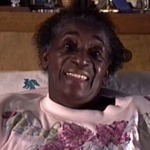Interviewer: Black History Club students, Jefferson Middle School, Eugene, Oregon
Interview Date: 1993
Location: Johnson residence, Eugene, Oregon
Duration: 0:27:32
This interview begins with Bertha Mae Johnson explaining that she moved to Eugene, Oregon with her husband from Atlanta, Georgia because he was offered work with the Southern Pacific Railroad. She adds that when she first moved to Eugene, there were very few Black families in the community, and that the Black residents of Eugene were often treated poorly. She explains that when she had children, they were bullied in school on account of their race. (Born in 1922, Bertha Mae Johnson and her husband had ten children, twenty-six grandchildren, and eighteen great grandchildren as of the recording of this interview.)
Mrs. Johnson then discusses the types of food, music, and clothing she remembers from when she had first arrived in Eugene. She describes how the Black community in Eugene gathered together by hosting lunches, and how she spent time with her children by working around the house with them. Mrs. Johnson then discusses more about racism in Eugene, and tells a story about a Black man who was murdered after marrying a white woman. She ends the interview by saying there’s less racism in Eugene at the time of her interview than there has been in the past.
Please note that this interview includes remembrances of a culture of racism and the use of racist, derogatory language toward African Americans, including the N word.
Dublin Core
Title
Description
Mrs. Johnson then discusses the types of food, music, and clothing she remembers from when she had first arrived in Eugene. She describes how the Black community in Eugene gathered together by hosting lunches, and how she spent time with her children by working around the house with them. Mrs. Johnson then discusses more about racism in Eugene, and tells a story about a Black man who was murdered after marrying a white woman. She ends the interview by saying there’s less racism in Eugene at the time of her interview than there has been in the past.
Please note that this interview includes remembrances of a culture of racism and the use of racist, derogatory language toward African Americans, including the N word.

